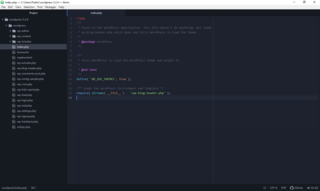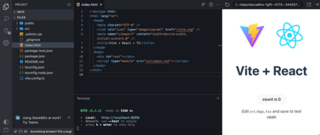In computing, a solution stack or software stack is a set of software subsystems or components needed to create a complete platform such that no additional software is needed to support applications. Applications are said to "run on" or "run on top of" the resulting platform.

Ext JS is a JavaScript application framework for building interactive cross-platform web applications using techniques such as Ajax, DHTML and DOM scripting. It can be used as a simple component framework but also as a full framework for building single-page applications (SPAs).
Svelte is a free and open-source component-based front-end software framework, and language created by Rich Harris and maintained by the Svelte core team members.
ASP.NET MVC is a web application framework developed by Microsoft that implements the model–view–controller (MVC) pattern. It is no longer in active development. It is open-source software, apart from the ASP.NET Web Forms component, which is proprietary.
V8 is a JavaScript and WebAssembly engine developed by Google for its Chrome browser. V8 is free and open-source software that is part of the Chromium project and also used separately in non-browser contexts, notably the Node.js runtime system.
Shopify Inc., stylized as shopify, is a Canadian multinational e-commerce company headquartered in Ottawa, Ontario. Shopify is the name of its proprietary e-commerce platform for online stores and retail point-of-sale systems. The platform offers online retailers a suite of services including; payments, marketing, shipping and customer engagement tools.
AngularJS is a discontinued free and open-source JavaScript-based web framework for developing single-page applications. It was maintained mainly by Google and a community of individuals and corporations. It aimed to simplify both the development and the testing of such applications by providing a framework for client-side model–view–controller (MVC) and model–view–viewmodel (MVVM) architectures, along with components commonly used in web applications and progressive web applications.

Ember.js is an open-source JavaScript web framework that utilizes a component-service pattern. It is designed to allow developers to create scalable single-page web applications by incorporating common idioms, best practices, and patterns from other single-page-app ecosystem patterns into the framework.
Meteor, or MeteorJS, is a partly proprietary, mostly free and open-source isomorphic JavaScript web framework written using Node.js. Meteor allows for rapid prototyping and produces cross-platform code. The server-side MongoDB program is the only proprietary component of Meteor and is part of the Meteor download bundle. It is possible to use Meteor without using the server-side MongoDB. It uses the Distributed Data Protocol and a publish–subscribe pattern to automatically propagate data changes to clients without requiring the developer to write any synchronization code. On the client, Meteor can be used with any popular front-end JS framework, Vue, React, Svelte, Angular, or Bazel.

MEAN is a source-available JavaScript software stack for building dynamic web sites and web applications. A variation known as MERN replaces Angular with React.js front-end, and another named MEVN use Vue.js as front-end.
Express.js, or simply Express, is a back end web application framework for building RESTful APIs with Node.js, released as free and open-source software under the MIT License. It is designed for building web applications and APIs. It has been called the de facto standard server framework for Node.js.

Atom is a free and open-source text and source-code editor for macOS, Linux, and Windows with support for plug-ins written in JavaScript, and embedded Git control. Developed by GitHub, Atom was released on June 25, 2015.

React is a free and open-source front-end JavaScript library for building user interfaces based on components by Facebook Inc. It is maintained by Meta and a community of individual developers and companies.

JHipster is a free and open-source application generator used to quickly develop modern web applications and Microservices using Angular or React and the Spring Framework.

React Native is an open-source UI software framework created by Facebook Inc.. It is used to develop applications for Android, Android TV, iOS, macOS, tvOS, Web, Windows and UWP by enabling developers to use the React framework along with native platform capabilities. It is used to develop the Android and iOS applications at Facebook, Microsoft, and Shopify. It is also being used to develop virtual reality applications at Oculus.
Angular is a TypeScript-based free and open-source single-page web application framework. It is developed by Google and by a community of individuals and corporations. Angular is a complete rewrite from the same team that built AngularJS. The Angular ecosystem consists of a diverse group of over 1.7 million developers, library authors, and content creators. According to the Stack Overflow Developer Survey, Angular is one of the most commonly used web frameworks, similar to React.
Next.js is an open-source web development framework created by the private company Vercel providing React-based web applications with server-side rendering and static website generation.
Microsoft, a technology company historically known for its opposition to the open source software paradigm, turned to embrace the approach in the 2010s. From the 1970s through 2000s under CEOs Bill Gates and Steve Ballmer, Microsoft viewed the community creation and sharing of communal code, later to be known as free and open source software, as a threat to its business, and both executives spoke negatively against it. In the 2010s, as the industry turned towards cloud, embedded, and mobile computing—technologies powered by open source advances—CEO Satya Nadella led Microsoft towards open source adoption although Microsoft's traditional Windows business continued to grow throughout this period generating revenues of 26.8 billion in the third quarter of 2018, while Microsoft's Azure cloud revenues nearly doubled.
ArkUI is a declarative based user interface framework for building user interfaces on native HarmonyOS, OpenHarmony alongside Oniro OS applications developed by Huawei for the ArkTS and Cangjie programming language.

StackBlitz is a collaborative online integrated development environment (IDE). The platform allows server-side software such as Node.js to be run entirely in the web browser, enabling fully online full-stack development. A number of web frameworks such as React, Next.js and Angular are supported.






